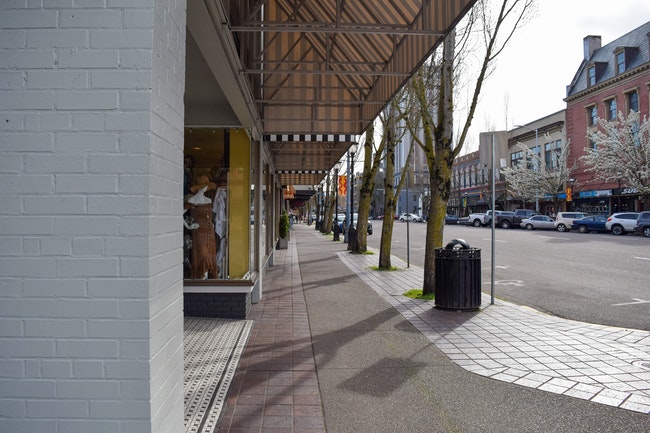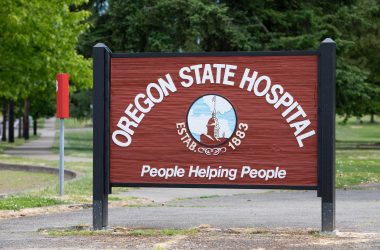
Downtown streets Salem were unusually empty in the afternoon on Tuesday, March 17. (Saphara Harrell/Salem Reporter)
NOTE: Salem Reporter is providing free access to its content related to the coronavirus as a community service. Subscriptions starting at $5 a month help support this.
People can now ride anywhere in Salem for free on a Cherriots, but there are fewer and fewer places for them to go.
Schools, closed by order of Gov. Kate Brown, will stay dark until the end of April.
For restaurants, it’s now a state crime to serve anyone inside. Some are continuing or adding takeout or delivery. Many, such as the beloved Court Street Dairy Lunch in downtown, simply closed.
At nursing homes, assisted living facilities and other care centers, no one is allowed in except staff and relatives of those who are about to die. And 2,800 inmates at the Oregon State Penitentiary and Oregon State Correctional Institution now have to make do with five-minute phone chats twice a week – offered at no charge – because they can no longer get visitors.
Government offices are closing their doors and governing boards are going to virtual meetings. Salem’s most iconic building – the Capitol – locked its doors to the public on Tuesday.
And there is hardly a place to go for amusement to escape the hourly announcements about the march of the novel coronavirus through the country and into more and more families.
Movie theaters, from corporate-owned screens to Salem Cinema, are closed. The Bush Barn Art Museum is among local museums and galleries closed. The venues for live performances – the Elsinore, the Grand, the Pentacle among them – have scrapped shows and turned off the lights.
On a daily basis, state officials use increasingly stark language about what Salem and the state face.
Across the state casinos such as Spirit Mountain voluntarily shuttered while the Oregon Lottery turned off video games as of 5 p.m. Monday.
Outdoor gatherings aren’t immune to cancellation. The Wooden Shoe Tulip Festival in Woodburn, about to get underway on Friday, decided to postpone. And the Monster Cookie Ride, the inaugural group bike ride organized by the Salem Bicycle Club that starts at the Capitol, is shelved for this year.
Pat Allen, director of the Oregon Health Authority, on Tuesday issued an “open letter” to Oregonians, imploring them to act to contain what has already proven to be deadly in Oregon.
“These restrictions will demand unprecedented sacrifice from us all,” Allen said. “We all have the power to stop COVID-19 and save the lives of people we care about.”
He again shared state estimates that the novel coronavirus could infect up to 75,000 Oregonians by mid-May. About one out of five will require advanced medical care. That foreshadows a dramatic escalation in detected cases of infected Oregonians.
As of Tuesday evening, the state listed 65 confirmed cases in 13 counties, including four in Marion County. The state listed one death – a 70-year-old veteran who died in Portland Saturday. Then, Lane County officials Tuesday night announced a second death – a 60-year-old woman who died in a Eugene hospital.
Allen said decisions by government and by individuals “will determine how many people our hospitals can treat, how many lives they can save and how long the pandemic will last.”
State government was heeding its own advice on social distancing as the two largest employee unions and state executives struck an agreement on circumstances for more telecommuting for state employees.
The state also brought on temporary employees to increase cleaning in state offices in Salem, Portland, Eugene and Pendleton. These workers will systematically wipe down doors, handrails, elevators and others frequently touched services.
In Salem, emergency meetings and emergency declarations flowed from government agencies.
On Monday, the Salem-Keizer School Board met in emergency session so district administrators could provide a briefing about school closures. Members of the public could watch the meeting live on YouTube on the CCTV Salem channel, with a dozen small squares on the screen for each board member.
The Salem City Council in an emergency session Tuesday night decided to bar congregating by two or more people on city streets – the tightest restriction yet to enforce “social distancing.” At the same time, councilors threw open two city parks to camping by the hundreds of local homeless.
Meantime, the city suspended until April the meeting of its many advisory boards and commissions.
Marion County public safety agencies are dialing back unnecessary contact to attempt to curb the spread of COVID-19.
On Friday, the Marion County Sheriff’s Office, Salem Police Department and Salem Fire Department announced they would stop attending community engagement events and limit public access to their facilities.
Salem police Lt. Treven Upkes said they would still respond to emergency calls, but would handle calls by phone when possible.
“We’re not stepping away from the public – we’re just trying to be smart about that,” Upkes said.
Salem’s mass transit system announced its own changes Tuesday, saying it would stop collecting fares . The agency said, however, that patrons had to enter through the rear door.
“The more drivers that stay well, the more service we can provide to you. This means that unless you need the ramp to board, please enter through the back door,” the agency said in its announcement.
The agency also said it was closing its lobbies at the downtown and Keizer transit centers. Until recently, Cherriots moved about 13,000 people a day.
At Kaiser Permanente clinics in Salem, anyone accompanying a patient to an appointment is screened at the door for a cough before being allowed in, spokeswoman Kimberly Mounts said.
Kaiser Permanente has also re-scheduled non-urgent medical and dental procedures in Salem offices, Mounts said and is moving others to phone or online visits.
“We’ve worked to reduce the number of members coming directly into the clinic,” she said.
Kaiser is working to offer COVID-19 testing through its own labs, though they’re not yet able to, Mounts said.
Salem First United Methodist Church has had services at the corner of Church and State streets in Salem since 1878. On Sunday, for the first time that lead pastor Rev. Dan Pitney can recall, there was no in-person service.
Pitney instead joined about 10 Methodist pastors and musicians from various Salem churches to run a live streamed service, leading prayers about health and peace to an empty room.
“We were joking how in seminary you often have to preach to a camera and then watch it,” he said. “If you can move past the camera to, ‘Oh there are real people behind it,’ it helps.”
Most houses of worship in Salem have shut down in-person services. Temple Beth Shalom canceled Shabbat services on March 14, and there will be no Friday prayer at Salem Islamic Center until further notice. The Archdiocese of Portland on Monday canceled all public masses through April 14, a period that includes Holy Week and Easter.
Christina Vasoc runs an adult foster care home out of her house in Salem, caring for five people ages 42 to 95. All of them have underlying medical conditions that make them vulnerable to COVID-19, she said.
Even before the state announced restrictions on visits to nursing and adult foster homes last week, she said relatives of those in her care were taking the virus seriously. Some opted for virtual visits using Skype. Others sent cards or letters.
Her residents, she said, are mostly taking things in stride.
“They’re an older generation that have been through more hardship,” she said.
She said she’s received little help from the state to plan for what should happen if a resident or employee gets sick. For now, she has gloves, disposable gowns and about 10 masks, which she uses when she goes out in public to shop for the home.
But she said she’s received no direction from Oregon’s Department of Human Services about what to do if they run out of critical supplies and can’t find more. She estimates her home has about a month of needed sanitizer and cleaning supplies.
“The scary part is when you look online everything is out of stock,” she said.
She and her husband run the home with one employee. If they fall ill, she said, quarantining at home would mean potentially exposing vulnerable residents.
“We are trying to keep the system from getting overwhelmed,” she said. “You don’t want to give it to the other residents and how do you do that if you don’t have protection yourself?”
Contact reporter Rachel Alexander: [email protected].









